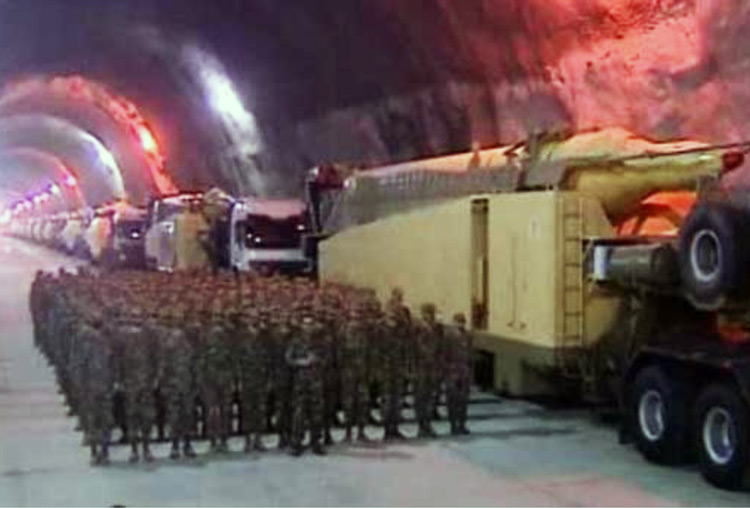The assassination in Tehran May 22 of Col. Hassan Sayyad Khodaei, an operative of Iran’s Revolutionary Guard Quds Force, widely believed to have been carried out by Israel’s spy and counterterrorism agency Mossad, has ratcheted up tensions in the Middle East.
Khodaei — previously a senior aide to Qassim Suleimani, the Quds Force head killed in a U.S. attack in Baghdad in 2020 — was shot and killed in broad daylight while sitting in his car in front of his home.
The Israeli press says Khodaei was a leader of the Quds Force’s Unit 840, which plans the group’s foreign operations. These include terrorist attacks along the Israeli border in the Golan Heights, as well as on Jewish and Israeli targets in Turkey, South America, Asia and Europe.
The Quds Force is central to the bourgeois-clerical regime’s counterrevolutionary actions abroad, shoring up the dictatorial regime in Syria and aiding reactionary forces in Iraq and Lebanon.
The Iranian regime openly calls for the destruction of Israel and expulsion of all the Jews. These are not idle threats, given Tehran’s stationing of Iranian forces in Syria close to Israel’s border, its patronage of Hezbollah in Lebanon, its deepening ties with Hamas in Gaza, and its long-term efforts to develop a nuclear weapons capability.
In the midst of growing antisemitic attacks in countries worldwide, Israel serves as a refuge.
Iranian drones have been deployed in attacks against Israel, as well as in Saudi Arabia, United Arab Emirates, and Yemen, and against a U.S. base in Syria.
Unit 840’s most recent operation was an assassination attempt on the Israeli consul in Turkey. That plot was reportedly uncovered by Mossad agents who abducted an officer of the Revolutionary Guard in Tehran and interrogated him for hours before releasing him.
The Israeli government refuses to confirm or deny responsibility for killing Khodaei. The New York Times reported that Israeli officials informed Washington that Mossad carried out the attack. Israeli officials were furious. Former Mossad Deputy Chief Ram Ben Barak said the leak “violated” its relationship with the U.S. government, while Iranian President Ebrahim Raisi vowed to take “revenge.”
Three days after the assassination, drones launched from inside Iran — with little doubt also by Israeli agents — hit the Parchin military complex run by the Iranian army, 37 miles southeast of Tehran, killing an engineer. The facility develops missile, nuclear and drone technology.
That Mossad can operate like this inside Iran is an indication of the weakness of the bourgeois-clerical regime. Many of the Israeli operations in Iran — like the assassination of key nuclear scientist Mohsen Fakhrizadeh in November 2020 — are aimed at undermining the regime’s drive to develop a nuclear weapons capability.
Tehran’s nuclear ambitions
Supreme Leader Ayatollah Ali Khamenei claims that Iran’s nuclear program is solely for “peaceful purposes,” but its nuclear weapons plans are no secret. That is a problem not just for Israel but for Tehran’s rivals in Saudi Arabia and elsewhere in the Middle East.
Since Washington withdrew from the nuclear pact with Tehran in 2018, the time it would take for the Iranian regime to produce enough nuclear fuel for a bomb “has shrunk to about one month,” reports Foreign Policy.
The Israeli government estimates, however, that it would still take another one to two years for the regime to be able to produce a functioning nuclear weapon.
The Israeli daily Haaretz notes that “assassinations and sabotage are only slightly delaying Iran’s nuclear program, and that Tehran very quickly recruits new scientists and repairs and even improves the damaged installations.”
Israel’s capitalist government has made progress in breaking out of diplomatic and political isolation in the Middle East. The governments of the United Arab Emirates, Bahrain, Kosova, Sudan and Morocco — which also feel threatened by the Iranian regime’s military and political interference abroad — have established diplomatic and economic relations with Israel since 2020. Known as the “Abraham Accords,” the agreements were brokered by the administration of President Donald Trump.
In a further advance, the governments of Israel signed a free-trade agreement May 31 with the United Arab Emirates, its first ever with an Arab country, eliminating customs duties on 96% of products.
These moves create openings for working people in these Middle East countries and in Israel and the Palestinian territories to establish closer ties and widen possibilities to join together in struggles against the impact of the capitalist crisis.
Tehran is trying to combat these growing relations with Israel. It won a symbolic victory May 26 when Iraq’s parliament passed legislation that bans visiting or promoting normalization with Israel, punishable by death. “No antisemitic law this draconian exists anywhere else in the Arab world,” an Iraqi American journalist told the New York Sun.
Iran’s revolution, counterrevolution
Iranian workers and farmers overthrew the U.S.-backed regime of the shah in 1979. “Shoras” — workers committees — were set up in factories, oil refineries and other workplaces. Women joined in the struggle demanding equal rights, and oppressed nationalities, including Kurds and Arabs, fought for greater freedom. The clerical rulers succeeded over years in carrying out a counterrevolution but have not been able to crush the fighting capacity of the working class.
Large protests have swept the country over the past several years. Workers and farmers have demonstrated against water shortages and rising gas and food prices, as well as raising political demands against the regime’s war moves abroad. Economic sanctions imposed by Washington and other imperialist powers since 2018 have also taken their toll, hitting working people the hardest.


